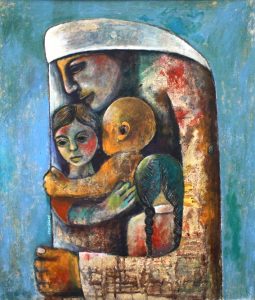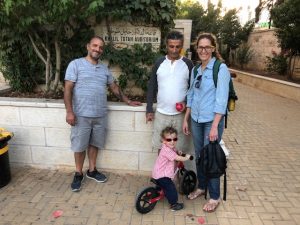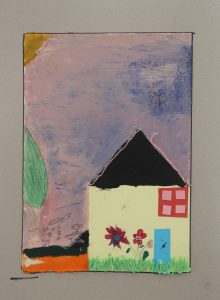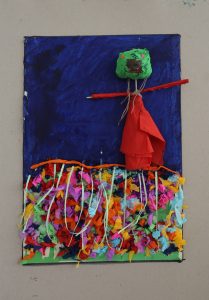Many Palestinian families are affected by Israel’s refusal to grant residency and family unification rights. According to the Geneva Conventions, Israel as an occupier is obliged to administer the occupied population in that population’s best interest. The therefore unlawful denial of the Palestinian right to residency and family reunification affects the core of our society and most directly impacts our families. These Israeli practices include the denial of entry to Palestine to foreign nationals, the refusal to issue visa extensions for such nationals who wish to remain in Palestine for more than three months – be it to work in Palestinian institutions or to stay with Palestinian family members − and the freezing of family reunification processes for almost two decades. In many cases, the foreign nationals who seek entry, visa extensions, or residency have Palestinian roots. Whether they are Palestinians who were born outside of Palestine, Palestinians who studied outside and could not afford to visit yearly to renew residency, Palestinians who are married and live abroad but want to visit family in Palestine, or Palestinians in other similar situations, they are still Palestinian. Restricting visas and residency status is simply another way to deny Palestinians their basic rights and to divide us into arbitrary categories as part of fragmenting our people.

My mother-in-law left Palestine on January 14, 1985, to follow her husband to the United States in hope of obtaining better medical care for his increasingly failing lungs. In 1986, her husband passed away in a foreign land, where she initially remained. In 1992, she boarded a plane to come home. At Ben Gurion Airport, she presented her laissez passer − the legal document for international travel issued by Israel to the occupied people of Palestine. The border control agent asked for her US passport, opened it to the first clear page, and placed a stamp. When she opened it to look, she saw that it was stamped with a visitor’s visa. She was legally rendered a visitor in her homeland, entering as a foreign national. This, tragically, is the story of many Palestinians who emigrated or studied abroad: they return home only to be rendered foreigners in their homeland by their occupiers.
A Palestinian’s decision to stay illegally when a visa extension has been denied is not taken lightly and entails that individuals be very cautious about leaving their towns or villages for fear of deportation. But the alternative is to literally uproot one’s life and leave.
Palestinians have no say in the process of deciding who is allowed to visit, work, volunteer, or reside in Palestine. Israel is the only authority that can decide who is or is not welcome in the territory it occupies, and to this end it has divided the people who live in the West Bank or Gaza into two categories. You either have a Palestinian hawiyya (identity card) and thereby enjoy legal residency, or you are a foreign national and must apply for a visitor’s visa every three months or so (the “or so” means that the visas issued by Israel vary in length between ten days and six months, in very rare cases one year).

When we think about foreigners with visa problems in Palestine, we might have in mind a Swiss intern at an NGO, an American volunteer in a refugee camp, a British teacher, or a Norwegian professor. But there are also the thousands of foreign nationals with Palestinian heritage and roots who over the last two decades have applied for lam shamel (residency based on family reunification) either while residing here or from abroad. They must enter or reside here on visitor’s visas (or they are rendered illegal residents after their visitor’s visa extensions are denied by Israel; at times, they live in the house that their grandparents or parents built and where they grew up). Some were born abroad and moved here at some point in their lives, others were born here but left to study abroad, some (like my mother-in-law) left to seek health care, others sought to earn an income in order to support relatives who remained behind; whichever way they left, they returned and found themselves without residency, without the right to their nationality, without the right to live with their relatives or loved ones.
My brother-in-law was born and raised in Ramallah; in fact, he is from one of the town’s founding families. He is visiting us right now as I am writing this article. He comes once a year on average, and every time he enters he is, in fact, lucky: He is allowed to enter via the Israeli-controlled border through a visitor’s visa, joining the many Palestinians who can only visit home as foreign nationals. You must remember that I am talking about tens of thousands of people, and each one has her/his own confusing, convoluted stories of struggling for legal status. I would like to share a few stories from my friends and family − who have trusted me with their stories even though they are nervous about publicly sharing them for fear of repercussions. Thus, I am changing names and omitting details.

Issa moved here with his parents and siblings years ago. The children are listed on the parents’ applications for lam shamel, and the entire family is evaluated and awarded (or denied) residency together. The application must list a relation who has residency in Palestine; that relation is the basis of the request for family reunification − the only reason that makes them eligible to be awarded residency. The person listed on the application of Issa’s family has since passed away and the application was considered void − but this information was never communicated to Issa’s family who kept waiting on news of this application. In the meantime, Issa came of legal age and now has to apply on his own for residency. With his family’s residency status still in limbo, he has no closest relation to list on his application. But even worse, at some point while the family was waiting, Issa was denied an extension on his visitor’s visa and had no choice but to remain here in a status that Israel considers illegal. Like so many other Palestinians without a hawiyya, he lives in constant fear of deportation and rarely leaves his town.
Tens of thousands of Palestinians are affected by the fact that since 2000, Israel has all but frozen the process of family unification. In theory, it is still granted in exceptional humanitarian circumstances, but in fact, such circumstances are simply not acknowledged.
Since children are registered on the hawiyyas of their fathers, when reunification is denied to the foreign-national father, his children are generally in a precarious situation as well. Samir, Yousef, and Noura are children whose Palestinian father has yet to be granted his hawiyya although his application is many years old. Instead, these children are issued visitor visas in their foreign passports every three months. Such a condition makes planning a true challenge and prevents the stability that is needed for a healthy family life, to say the least. The children sense the stress their parents live with, always wondering whether they will have to move suddenly and leave their school, teachers, friends, and extended family. And each visa renewal process becomes an emotionally exhausting gamble that also puts a financial strain on families − which lower-income households simply cannot afford.

For people who work in the occupied Palestinian territories, there is the option to obtain a visa through a work contract. The visa renewal process is longer and a bit more complicated than a spousal visa because the worker has to go through a security check first. But the end result is the same: a visitor visa that states that the holder is “not permitted to work.” So this visa is jokingly called the non-working work visa. For some time now, it has not been clear whether spouses are allowed to work because some employees have been denied a visa extension based on the fact that they are married.i*1 A further difficulty is that the rules and regulations that determine who is eligible for a visa are constantly shifting and applied in a haphazard manner. The situation is not only economically straining, it affects local schools and universities and thereby also infringes on Palestinians’ right to education; it affects doctors and thus infringes on the quality of health care.
But the prevention of family unification affects not only foreign passport holders. When Mona married Samir, she knew that things would not be easy. Mona is from a Palestinian village in the Israeli Galilee, the area that Palestinians call the 1948 area or al-dakhel (the inside); Samir is from a village near Nablus in the West Bank but works in Ramallah. It took seven years for Samir to be registered as the father of their son Nadim because Mona wanted her children to have the same privileges as she has, and these rights are associated with having an Israeli identity card.*2 They include freedom of movement, social security benefits, access to the much better health care in Israel, and many more. Mona will never be able to live with her husband near her family; in fact, she has to break all kinds of rules to be able to let her children visit their maternal relatives. If the family wants to travel, they cannot cross the Israeli-controlled border via the same gate. Many Palestinians who were born in Jerusalem have lost their Jerusalem identity cards either because they decided to raise their families in the much more affordable West Bank or because they obtained foreign citizenship. While Jewish residents of Jerusalem may carry two or three foreign passports and may live anywhere in the world, Jerusalemite Palestinians will lose their residency if they obtain a foreign passport or when they cannot prove that they reside in Jerusalem.

Murad is from Ramallah and more often than not has been able to obtain a permit to live with his wife Mariam in East Jerusalem; initially he had to renew it every six months, later on every year, and now − after more than twenty-two years − every two years. The renewal process is difficult, to say the least. Offices close at noon, and people would go so far as to rent a tent for 400 shekels to stay overnight and secure their place in line for the next morning. During one period, Mariam had unsuccessfully waited in line thirteen times, carefully documenting each failed attempt before she was finally able to enter on a day of pouring rain. But the officer refused to process her application because that particular day was reserved for other issues, and he informed her that their family unification application had been cancelled because she “had not shown any interest in renewing the permit.” The subsequent court proceeding to get their family unification application reactivated took a year and a half. Murad is also not allowed to drive a car in Israel, so Mariam always has to drive. Just one week before she gave birth to their youngest son, the couple were on their way home from the grocery store – Mariam needed Murad to help her carry things – when 20 meters away from their home they were caught by the police. Since Murad’s permit was expired, Mariam was charged with transporting a person who was illegally in Israel, and they were both taken to prison. It took hours for their lawyer to prove that Murad was allowed to remain in East Jerusalem until the court ruling, and when they were released, he advised Mariam to no longer let Murad ride with her in their car. They joke now that Faris could have been born in prison. During the year and a half of waiting for the court ruling, Murad was ordered to stay put, not allowed to visit his mother in Ramallah. But in fact, the couple were lucky because they applied for this “privilege” early. Every spring, since the second Intifada, the Knesset renews a law that forbids West Bank residents to live with their Arab-Israeli spouses in Israel.*3 The families must live in the West Bank, and permits to visit their in-laws who live in Israel are difficult to obtain. Such restrictions affect thousands of couples and families. By preventing visits in a society in which social life is traditionally centered on family gatherings, these laws cut families apart and fragment Palestinian society.
Regarding the lack of progress in the processing of lam shamel, family unification, the Israeli and Palestinian authorities are blaming each other. Israel claims that it receives no applications; the Palestinian Authority makes it known that it cannot submit applications unless requested to do so but falls short of making this an official statement. The official stand is that Israel will grant family unification in special humanitarian cases, but this label does not apply to the retirement-aged woman who lives illegally in the West Bank to care for her ailing mother who is almost 100 years old and has no other close relatives in Palestine. Nor does it apply to the young father who was born in Brazil yet has lived in the West Bank ever since he was a toddler; he has spent the last year and a half in an Israeli prison, awaiting deportation to a country that refuses to let him enter since he has no passport from this country, has no relations there, and does not speak the local language.*4
Family and social bonds are vital to Palestinian society, and it is important to remember that many, if not most, of these “visitors” are members of Palestinian families, be they wives, sons, brothers-in-law, or mothers. By denying visa extensions and refusing to process lam shamel applications, Israel breaks down our communities and our larger families.
*1 See Yotam Ben Hillel, “Israel is making it impossible for foreign nationals to live in the West Bank,” +972, August 17, 2018, available at goo.gl/QCKsSP.
*2 See also Nir Hasson, “Israeli Family Unification Law Leaves 247 Palestinian Kids Without Legal Status,” Haaretz, June 18, 2016.
*3 See “The military to HaMoked: there is no flaw in the complete freeze of family unification in the occupied territories,” HaMoked: Center for the Defense of the Individual, July 15, 2018, available at goo.gl/Ps1P91; HaMoked is an Israeli human rights organization that works for the rights of Palestinians, among them family unification. For more information on their activities visit http://www.hamoked.org/.
*4 See Amira Hass, “Israel Seeks to Deport Brazil Man Who Has Lived Almost Entire Life in West Bank,” Haaretz, October 13, 2018.


